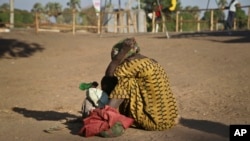Since the start of 2023, the Lutheran World Federation, a nonprofit working with refugees in the Palorinya settlement in Uganda’s Obongi district, has recorded one suicide and 20 attempts by refugees.
18-year-old James Wubam, who came to Palorinya with his uncle, says his uncle’s wife would deliberately deny him food. He also said he found it difficult to ask his uncle for basic needs, including school requirements.
Wubam said he doesn't have any siblings to share these issues with, and this has put him in a deep depression.
"I thought of hanging myself. I went to a local club with my friends and consumed some alcohol. When I got home, I contemplated suicide," Wubam said.
According to the Lutheran World Federation, between January and September 2019, Palorinya recorded the most suicide cases of all refugee settlements in Uganda, with 29 suicides attempted and 13 completed. In 2022, the federation says, one suicide and 45 attempted suicides were reported in the settlement.
Isaac Oturi, a clinical psychologist with the Lutheran World Federation, says most of the 20 suicide attempts so far this year involved young people triggered by unmet needs.
"In the settlement here, people, their hands are tied. You survive only on given items. You can’t make it for yourself," Oturi said, "to make it worse is that even those who are in position to work, there’s very few, or less or minimal livelihood opportunities that would help them to have a better living."
Of the more than 1.5 million refugees in Uganda, most of whom come from South Sudan, Palorinya hosts 123,000. In July, the World Food Program will begin targeting food and cash aid to refugees based on need. Fearing they will be left to fend for themselves, some refugees have considered suicide.
Micheal Gaale said that when he found out that his name was listed under those whose families would not get food, his wife left him. Leaving him to fend for four children, he contemplated a quick escape.
"They will call you baba when they want to eat. But there’s no food, there’s nothing. I cannot go find labor work from people. I sit in one place. It’s too much, and its better for me to hang myself," Gaale said.
With little funding and just one clinical psychologist in the settlement, many victims do not get the support they need.
To ensure each case is attended to in time, agencies have set up para-counselors, also known as suicide gatekeepers. Para-counselor Deanga Betty Kenyi says they have to depend on second parties to get help for those attempting suicide.
"The neighbor will run to us and give us that information. Then we will go and assess how the client is."

Forum